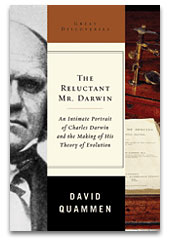
David Quammen.
Though we do not, alas, live in the kind of world where science writers become celebrities, David Quammen has developed an unusually devoted fan base. As a young man he aspired to write fiction, and that sensibility remains evident in science writing that reads like literature — humane, absorbing, occasionally thrilling. His “Natural Acts” column for Outside magazine, which ran from 1981 to 1995, yielded two National Magazine Awards and a Guggenheim Fellowship, and more awards awaited the series of critically and popularly lauded full-length books that came after.
The latest focus of Quammen’s careful attention is Charles Darwin, father of modern biology and source of an idea so radical its implications are still only imperfectly understood: evolution by natural selection. Rather than the extensively covered journey aboard the Beagle, Quammen’s The Reluctant Mr. Darwin tracks the naturalist’s life through the 20 years afterward — 20 years when he kept his explosive idea under wraps, pondering when and how to release it to the world.
Since Quammen passed through town as we were putting together Grist’s God & the Environment series, I chose to push him into areas of religious, philosophical, and sociological speculation. The soft-spoken writer answered carefully.
If environmentalists are responsible for leading the fight to preserve species, to stave off the sixth great extinction, to prevent habitats from being chopped up into tiny pieces that can’t support viable populations, then they need to understand how evolution functions — the importance of variation within populations, the amount of time it takes to create biological diversity, the necessity of habitat diversity to create species. Anybody who’s arguing with the general public and politicians about things going extinct needs to understand where biological diversity, complexity, and adaptation come from, and how slow the process is, and how many of the things we’re doing on this planet prevent further evolution, further speciation, from ever happening.What do you think environmentalists have to learn from Darwinian evolution?
Is there a problem with someone who does not believe in evolution for religious reasons joining the environmental movement?
No. We need all the allies we can get. I don’t think we can afford to say, oh, we don’t want you guys helping to save this batch of habitat or stop this dam because you don’t believe in evolution. If they believe that every species was created instantaneously, from scratch, in its current form, by a busy, interventionist God, and they believe that therefore it’s wrong for humans to eliminate any of those God-made species, then let’s set our differences aside, at least for the sake of political tactics, and work with them. Leave the arguing about where those species come from for later.
But if they say, the price for working with you is that we want intelligent design taught in science curricula, then it’s a deal breaker. Nope, sorry. That cannot come into the science curricula of our public schools, because it’s not science. Teach it in comparative religion, along with Buddhism, Christianity, Islam, Zoroastrianism, and the belief that the earth is supported on four big elephants that stand on the back of a giant turtle.
A religious environmentalist might say, you have science on your side, but what I have is a reason to prevent species loss: God has imbued all creatures with value and given me dominion over them. From your perspective, there’s just a meaningless pageant of one change after another. Why does any of it matter?
That is a wise question for them to ask. Why should we care? It’s a question I’ve been dealing with since I published an earlier book, The Song of the Dodo, about extinctions.
People who instinctively care about these things have to realize that the question doesn’t have any obvious or easy answer. Our first incentive to prevent those extinctions is an instinctive, irrational one: we care about these things ourselves. We find inherent value in them. But you can’t transfer that value to other people. It’s not necessarily persuasive.
You have to think carefully, and craft arguments realistically, as to what is lost if we lose biological diversity on the planet. Part of the argument is anthropocentric: it comes back to harm us physically. We lose ecosystem services essential to the health of the human population. We lose the possibilities of applications for medical and other utilitarian purposes.
But we have to realize that those arguments only go so far, and some of them are double-edged. If we’re going to save such-and-such tree in the rainforest mainly because it produces some sort of medicine for humans, fine for now, but what happens when they discover a way to synthesize that medicine in the laboratory much more cheaply than they can grow it in the Amazon? You lose that argument abruptly.
Having realized the limitations on pragmatic arguments, we have to go beyond that, immediately and routinely, and argue that one of the main reasons we shouldn’t eliminate half the biological diversity on this planet is that the universe will be a whole lot uglier, more boring, and more lonely. That’s not as much a tangible argument, but we need to make it tangible.
Darwin himself famously lost faith over the years. Was your sense that his discoveries and thoughts on biology drove the loss of faith? How much of a relation do you think there was?
I think it was two things, closely related.
He was very rational, careful, orderly thinker. He discovered the older he got, the more he wanted his convictions to be grounded in observable evidence. You could say he was a materialist by disposition. As he got older, that disposition put him in conflict with a lot of conventional beliefs. Specifically, there was this question of where diversity comes from, and the closer he looked at it, the more he realized there was a very logical, economical explanation that involved only physical causes. It satisfied him very much and conflicted completely with the conventional explanation. So that pushed him away from conventional religion.
Then there was the death of his father, followed by the death of his daughter, Annie. The second in particular completely soured him on the notion that the universe was ruled by a God who determined all things, who had all power, and preferred the good, yet would allow for irrational, inexplicable evil such as the suffering of innocents. That was more on the emotional side than the intellectual side.
Those two things converged, and he was done with Christianity.
Do you think that evolution is incompatible with Christianity?
Evolution? No. Darwinian evolution? Yes.
Darwin believed the variations within populations that natural selection works on are undirected — essentially random. Not random in the sense that they have no causes; random in the sense that whatever causes them — and he didn’t know — is independent of adaptive needs.
Random variations worked on by natural selection — I think that’s incompatible with the idea of evolution guided by God. It’s not incompatible with the idea of the existence of God. It’s not incompatible with the idea that God created the universe and set it in motion. But I think it is incompatible with the idea embraced by theistic evolutionists that God used evolution as a way of accomplishing His design. The design part is completely contradictory to the random variation part.
I also think [Darwinian evolution] is incompatible with the idea that, as humans evolved from other primates, at a certain point God reached down and went “Bing!” and put in an immortal soul which has capacities and responsibilities completely different from what you might find in a chimpanzee.
But I know that not everybody sees it that way, even some people who’ve thought about it pretty carefully.
What do you think about the popular notion that physical evolution of humankind has been overtaken by intellectual or spiritual evolution, or mimetic evolution, or cultural evolution, or what have you?
That’s mostly true. Most evolution now is cultural evolution, for humans. But I doubt that it’s completely true — it’s almost impossible that it be completely true. Whenever you have excess reproduction and differential survival, you have changes of gene frequency in populations, and therefore you have evolution.
I would say, at risk of saying something that has me apologizing like the Pope or the president of Harvard, that evolution must be occurring, and that the way to detect the direction of it would be to look at the people who have the greatest reproductive success. Who on this planet has the greatest reproductive success? It probably is not educated people in North America, who tend to limit their reproduction to 2.1 kids. It’s probably people in the tropics who have little access to education, little access to family planning techniques and information, and who are in some cases still having six and eight kids. That’s reproductive success.
So, it might be that evolution is still occurring among the human species, and making the human species incrementally better capable of living in impoverished conditions in the tropics. Maybe we’re gradually acquiring some increased resistance to malaria. Maybe we’re gradually acquiring some sort of increased resistance to all sorts of intestinal parasites you’re afflicted with if you don’t have access to clean water. People who live under those circumstances and still have nine kids, of whom six survive, are the reproductively successful individuals of our global population.
[Physical] evolution is happening — with the understanding that evolution doesn’t make a particular species better or smarter, necessarily, just better attuned to whatever circumstances it’s living in. That’s my guess.
Polls still show that half of Americans, more than half in some polls, reject evolution. Do you ever see that changing?
It’s an American thing. Actually, it’s an American and a Turkish thing. There’s an article just published in New Scientist that assembled poll data from 34 countries — 32 European countries plus the U.S. and Japan. They were ranked from one to 34 in terms of acceptance of evolution. Number one was Iceland, then Denmark, France, Germany, Sweden, Japan, Britain … 33 was U.S., 34 was Turkey. Latvia, Bulgaria, Romania — much more acceptance of evolution than in the U.S. or in Turkey. And Turkey has an Islamist creationist movement of some force.
What do you make of that? Why the U.S.?
We’re a country that was founded by religious cranks. Maybe that’s part of it.
But even they were less religious than we are now.
The Jeffersonian founding fathers were less religious, but the group that came before them — the Jamestown wave, the Mayflower wave — they were religious cranks.
That’s only a half-serious answer, at most. I don’t know. It’s mysterious. There was a lot of resistance in this country to Darwinian ideas when they first came out, and then some biologists got on board. There was another wave of resistance around the time of the Scopes trial, and then it settled down. Then there was another wave of resistance in the late ’60s with old-fashioned creationism, and that was essentially turned back by legal decisions like Edwards v. Aguillard, in the Supreme Court. Then came intelligent design.
There’s a political element, too, no?
Yeah, it’s part of a political agenda of the Christian right to undermine the teaching of evolution — to undermine, therefore, a leftist, materialist, godless, merely science-based drift into social relativism. It’s all connected. It’s as much a political movement as a scientific movement.
It’s also something else too — part of the American character, if there is such a thing — and that is an eagerness to tell the experts, “Well, no. Screw you.”


